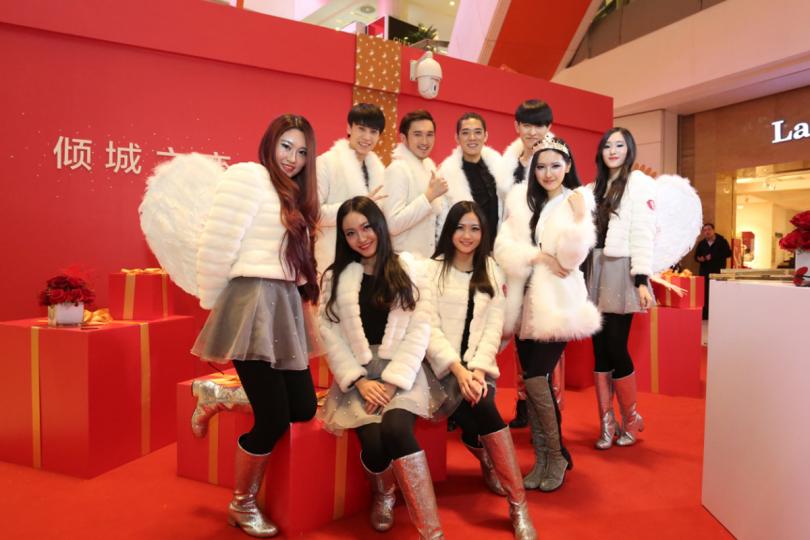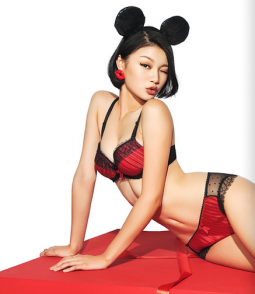In China, It’s Va-Va-Voom Times for Lingerie Brands
May 13, 2015 by admin
Filed under Latest Lingerie News

Ad Age LookBook

Learn more
At a Beijing mall, models clad in feathered white cupid wings approached couples with a cheeky question for the men: Do you know your wife or girlfriend’s bra size?
It was a Valentine’s Day promotion for Beijing Aimer Lingerie Co., one of China’s top lingerie retailers, boasting nearly 2,000 points of sale. The company was founded 23 years ago by a metallurgist with ideas for improving bra underwires; Aimer, its main brand, now charges $60 to $290 for a classic, well-made bra, defying “Made in China” stereotypes.
These are interesting times for China’s lingerie market: Sales are robust, foreign players are making inroads and local favorites are refining their offerings and branding.
Aimer tapped boutique branding agency Creative Capital Shanghai for the Valentine’s event in Beijing. Men who entered their partner’s correct bra size into a mobile app won a bra delivered by an elegant cupid.
While a campaign involving men guessing bra sizes could easily turn tacky, the result was sweet, centering on the question of how well people know the ones they love. About 3 million people watched an online video of the event, which included other games for couples to test their knowledge of each other. (Watch a video of the event here.)
China’s lingerie market, worth more than $20 billion in 2014, has logged double-digit growth annually since 2010, and the potential is “huge,” said Neil Wang, global partner and managing director for Frost Sullivan Greater China. High-end lingerie made up 30% of the category’s sales last year, Mr. Wang said.

When Aimer launched in 1992, lingerie wasn’t a big thing, and women generally wore utilitarian underthings. Many still do, especially older and rural women, judging by laundry hanging to dry on trees and signposts, even in cities like Shanghai. Meanwhile, 20-somethings prowl high-end malls with extensive lingerie offerings. Fanny Zhao, a stylish 25-year-old in black plastic glasses with no lenses, guessed she spends $500 a year on brands such as Triumph, a German label.
Indeed, the market has matured, with people willing to splurge on invisible luxuries. Women “started to realize the importance of underwear and were willing to treat themselves better by purchasing premium underwear products with better comfort and design,” said Fangting Sun, research analyst at Euromonitor International.
The No. 1 player in China is either Beijing Aimer (by Mintel’s count) or mass-market local brand Cosmo Lady China Holdings Co. (according to Euromonitor). In any case, the market is highly fragmented, with the leader holding 3% to 4% at most. Foreign brands in the top 10 are Japan’s Wacoal Holdings Corp. and Germany’s Triumph International AG.
U.S. giant Victoria’s Secret opened its first nine stores on the mainland in January, selling beauty products and accessories. The company hasn’t explained the lack of bras. There’s speculation it wants time to observe local tastes and sizing preferences.
“If you go in with a full-scale lingerie offering, women might buy it once and feel uncomfortable if it doesn’t fit,” said Torsten Stocker, Hong Kong-based partner at management consulting firm A.T. Kearney. “And then it’s very difficult to get back into the game if you have a reputation as a brand that looks glamorous but is not comfortable to wear.”
Aimer has a research center with the Beijing Institute of Fashion Technology devoted to amassing data on Chinese women’s measurements. (The center says cup sizes have increased since the 1990s in China, as they have elsewhere, because of changes in diet and standards of living, according to a recent China Daily article.)
The privately held company has made waves lately in architecture blogs for a stunning new campus in Beijing that showcases its ambitions as a major fashion brand. Aimer also sells in several Asian locations outside mainland China, and North Americans can buy it online.
Its positioning is a U-turn from Victoria’s Secret. “Aimer” is French for “to love,” but the brand says that doesn’t always equate to romance. “Love is also about family love, friends, society,” said Concon Dou, marketing manager of Aimer’s main brand. And it’s about loving yourself too, she said. (While Chinese women favor underwire bras that plump up their chests, she said, Aimer is trying to convince them to try more natural and comfortable styles.)
“They’ve created this very cool lifestyle concept around love and caring,” said Louis Houdart, who founded Creative Capital Shanghai, the agency behind the Valentine’s campaign. That positioning is helping Aimer branch out, he said. Now there’s Aimer Kids and Aimer Home — concepts that sexy Victoria’s Secret might have trouble pulling off.